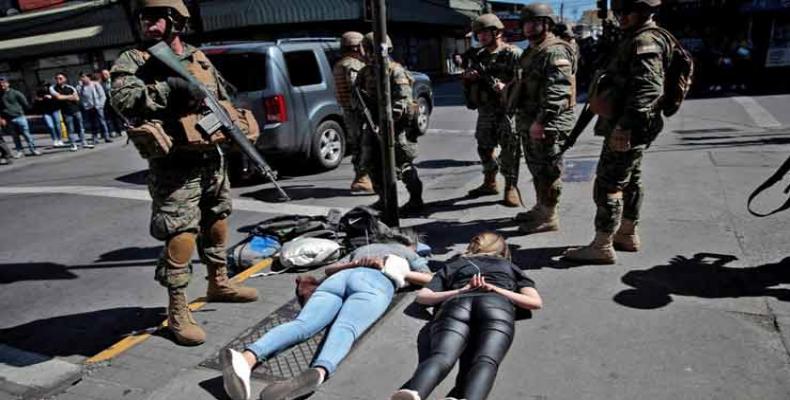Police-perpetrated torture and abuse are reopening old wounds in Chile
by Ilich Silva-Peña / Truthout
What began over a public transportation fare hike in Chile grew into a massive protest movement against inequality and abuse. The protest demanded a profound social change. On October 19, former Interior Minister Andrés Chadwick, along with President Sebastián Piñera, declared a state of emergency, flooding the country’s streets with police and military officers to limit popular mobilization.
Human Rights Watch recently reported on the police actions and abuses — including mass arrests, torture and sexual abuse — during the protests. According to the report, “The police appear to be more likely to force women and girls to strip than men.” The latest revelations reaffirm Amnesty International’s earlier findings of severe human rights violations in Chile.
After about 40 days of social mobilization in Chile, Human Rights Watch reported 26 deaths, 341 complaints of torture, 74 charges of sexual abuse and 11,564 people injured (1,015 injured by pellets). Although the report focuses on the actions of the police, it calls to mind brutality found in a dictatorship. Take, for instance, one woman’s report of abuse:
Police bent their arms hard, pulled their hair, and took them to the police criminal lab, she said. They spent five hours sitting in a corridor there, handcuffed. At midnight, they were transferred to a police station, where police made them undress and squat fully naked. Police kept them in a cell without water or food until 6 a.m., when the curfew ended.
We need to remember that Chile was a dictatorship from the coup d’état on September 11, 1973, until March 1990, when the country began a transition to democracy. Under Augusto Pinochet, there were reports of thousands of people being killed or “disappeared.” Along with other human rights abuses, during this time period, some Chileans were tortured, exiled or arrested. Among victims, there were hundreds of children. However, this brutal time in Chile’s history was not forgotten after 1990; in fact, some of the same players are active in the country’s situation today.
For instance, former Interior Minister Chadwick was a young adherent to the Pinochet government. In 1977, he was part of the meeting organized by the far-right Youth Front for National Unity that brought together 77 youth leaders to institutionalize a new political and economic order of the Pinochet dictatorship.
Since that time, Chadwick has dedicated himself to working for the consolidation of the civic-military dictatorship. In 1979, he was designated by the Pinochet regime as president of the Student Federation of the Catholic University (FEUC), the student organization of the Pontifical Catholic University of Chile. In this role, Chadwick continued the legacy of other right-wing leaders, using the FEUC to build and recruit members for a youth movement that supported Pinochet’s regime. The following year (1980), he was designated as the leader of the Youth Front for National Unity. Today, both Chadwick and Piñera face impeachment in the Chilean Parliament due to human rights violations.
The emotions of fear and anger experienced during the Pinochet dictatorship have returned to Chile. Although the first years that followed the end of this period saw some efforts to generate justice and reparation, the wounds never fully healed. The government has made us go back to a period that we thought we might have forgotten. These actions do nothing but retraumatize those who lived under Pinochet. The problem with the new shock in Chile is that it has broken out when the reconciliation process has not yet been completed.
Yet resistance continues. There is still no way out of the crisis in our country. Even so, the problem of human rights violations poses a call for international solidarity. It also puts us in front of a new challenge that will inevitably mean this process of retraumatization. As a Chilean society, we will need to renew healing processes for affected victims and, subsequently, a nationwide healing process that will reconcile our present with our past. The wounds of the past are not closed yet, even as new wounds are opening. Hopefully, these further human rights abuses stop as soon as possible. The deeper the damage, the greater the need for necessary acts of reparation will be.


